Symposium in Cuba to study the history of Freemasonry in Latin America
December 9, 2007
Cuban revolutionary and Freemason Jose Marti giving the Masonic sign of the Hand on Heart signifying loyalty to the Craft
A historic approximation to the freemasonry "allows a better understanding, a better rapprochement between the institutions and above everything else a better comprehension of our cultures, because, undoubtedly the freemasons have an important role in Latin America," Cuba will gather together for the first time experts from Europe and Latin America in an academic meeting that will debate the history of freemasonry in Latin America and its relationship with equivalent institutions, explained to EFE, the Cuban historian Eduardo Torres Cuevas.
According to Torres Cuevas, president of the Department of Historic Studies of the Cuban Freemasonry of Havana University, which is the organizer of the event, it is about an "academic" meeting with the goal of creating the Center of Studies of the Latin American Freemasonry.
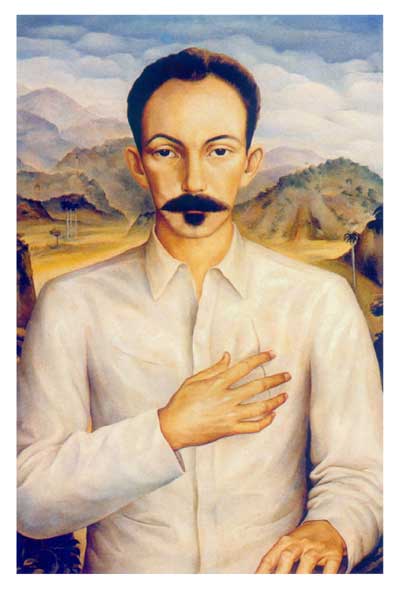
Freemason Salvador Allende, Socialist president of Chile (1970-1973), of the Progreso Lodge No. 4, Valparaíso
The writer, in an interview with EFE, indicated that the meeting, which is expected to be held between the 5th and the 8th of December, will count with the presence of important researchers, such as the director of the Center of Historic Studies of the Spanish Freemasonry José Antonio Benemelis, Aldo Mola, the most important historian of Italian Freemasonry, as well as freemasons and academics from Europe and Latin America.
"The main objective is to give a boost to these studies, since we consider that freemasonry has an important role, a role debated and debatable in the history of the Latin American Independence movement, specially the Cuban one," specified the 2000 Social Sciences National Price Winner who is also the director of the National Library "Jose Marti."
He believes that it is necessary to systematize this kind of meetings to discuss the role of the institution in Latin American independence. Freemasonry "is a non political institution; it is not religious, but it is ethical, therefore their projection joins together religious and politicians and is the nucleus to understand the intellectual, social, political and cultural world of Latin America," emphasized.
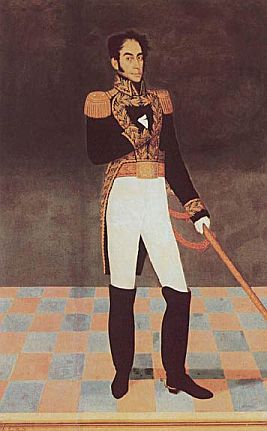
Freemason Simón Bolívar, president of Venezuela, Colombia, Bolivia, & Peru, of the Order and Liberty Lodge No. 2, Peru, giving the Masonic sign of the Hidden Hand
In this symposium "we are not going to interfere in any internal projection of the freemason's bodies," affirmed the author of "Historia de la Masonería Cubana."
"We are going to help to enrich the culture of everybody, freemasons and not freemasons, about a topic, many times even the freemasons do not know a lot about the history, with the vision have had that institution and what its role was in our history," he said.
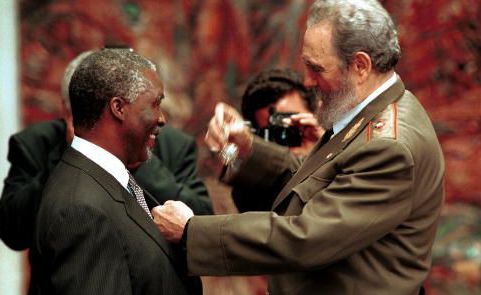
South African president Thabo Mbeki inducted into the Order of Jose Marti by Cuban dictator Fidel Castro
A historic approximation to freemasonry "allows a better understanding, a better rapprochement between the institutions and above everything else a better comprehension of our cultures, because, undoubtedly the freemasons have an important role in Latin America," he added.
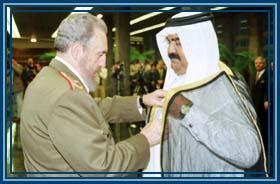
Cuban dictator Fidel Castro inducts the billionaire Emir of Qatar Sheikh Hamad Bin Khalifa Al-Thani into the Order of Jose Marti
According to my criteria, freemasonry is in a moment "of deep reflection" out of which "there will be a new, very necessary, strengthening projection to adequate it to the current times." Cuban freemasonry was founded in 1859 and is one of the oldest from Latin America, and many famous personalities have been freemasons, such as independence heroes Carlos Manuel de Céspedes, Antonio Maceo, José Martí, Ignacio Agramonte, and Máximo Gómez. In the last 50 years, freemasonry in Cuba has had difficult moments, although, according to Cuevas, "notwithstanding the real difficulties they have been functioning on a regular basis."
After a period of decline, he insisted, Cuban freemasonry is moving through a "development moment with excellent relationships between the State and the Institution," with a growing number of their members, who have grown from 14,000 to 30,000 in 341 lodges.
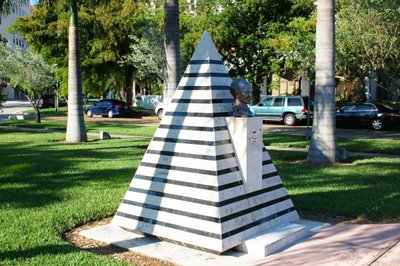
A bust of Jose Marti set on a Masonic pyramid in Coral Gables Florida
Their "reactivation" starts from "a younger generation that based on the force and the experience of the older ones is really giving a more important social air," he indicated.
Torres Cuevas believes that, as an ethical institution, freemasonry can play a "very important and positive role" in Cuban society.
. . .
Related
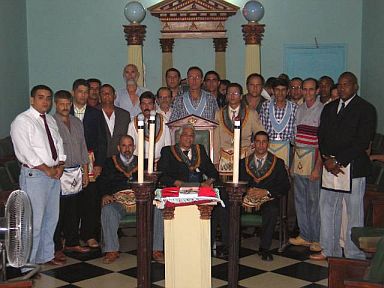
Grand Lodge of Cuba - Logia Havana